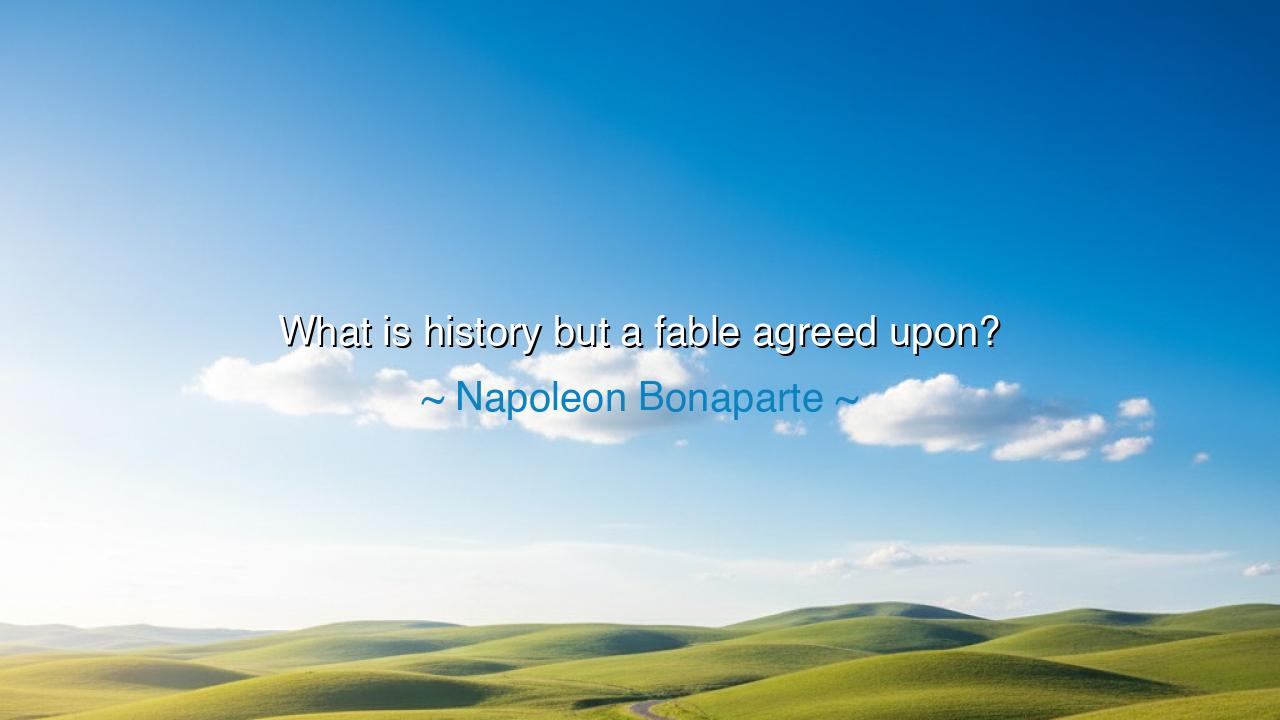
What is history but a fable agreed upon?






In the piercing and immortal words of Napoleon Bonaparte, conqueror, emperor, and visionary of his age, we find a truth as unsettling as it is profound: “What is history but a fable agreed upon?” These words, born from the mind of a man who shaped history with his own hands, remind us that the stories we inherit are not carved in stone but woven in human memory. History, Napoleon suggests, is not the pure record of fact—it is the tapestry of interpretation, a mosaic built from the fragments of memory, power, and persuasion. What we call truth may be but an echo, refined and retold until it pleases those who survive to tell it.
The origin of this quote lies in Napoleon’s reflections during his exile on the remote island of Saint Helena, where he was sent after his final defeat at Waterloo in 1815. Stripped of his empire and power, he turned to contemplation. Surrounded by the silence of the Atlantic, he saw how swiftly the world rewrote his story. The same nations that once trembled before him now painted him as a tyrant, while his own followers saw in him a misunderstood hero. Thus, he spoke these words—not in arrogance, but in revelation. He saw that history is not written by the defeated, but by the victors, and that what endures in books is not always what lived in truth.
To say that history is a “fable agreed upon” is to unveil the frailty of human recollection. Every generation retells the past in its own image, polishing what was once raw, reshaping chaos into narrative. The battlefield, where thousands cried and bled, becomes a line in a textbook; the revolution, which tore nations apart, becomes a noble myth of freedom. Facts fade, motives are forgotten, and in their place rises story, made palatable for the living. Napoleon, who had seen both adoration and exile, understood this duality. He knew that memory itself is a battlefield, where truth and legend wrestle endlessly for dominion.
Consider the tale of Spartacus, the gladiator who led a slave rebellion against Rome. To the Romans, he was a barbarian, a threat to order. To later generations, he became a symbol of resistance and courage. His life did not change—the fable did. Likewise, Joan of Arc, burned as a heretic, later canonized as a saint; Galileo, condemned as a heretic, later hailed as a genius. The truth of their lives was constant, but the agreement of history shifted with time. Napoleon’s insight thus pierces deeper: that truth, though eternal, is fragile in human hands, and that history is often the compromise between remembrance and forgetfulness.
But Napoleon’s words are not meant only as accusation—they are also an invitation to awareness. He calls upon us to question, to look beyond the surface of what we are told. History, he warns, must be read not as scripture, but as conversation—a dialogue between the past and the present. When we study the deeds of kings and rebels, we must ask: whose voice is missing? Whose story was silenced when the fable was written? In every age, those who hold power write the narrative; the wise must learn to listen for the whispers beneath it.
This truth extends beyond nations and empires—it lives in every human life. Each of us, too, becomes the historian of our own story. We remember what flatters us, forget what shames us, and craft our own fables for others to believe. Yet the lesson of Napoleon’s reflection is not despair, but honesty. To live truthfully is to acknowledge that memory deceives, and to seek the deeper reality beneath appearances. We cannot escape the fables of history—but we can choose to make them honorable ones.
So, my children, learn this wisdom well: seek truth, but question the tale. When you read history, read it with both heart and mind. When you speak of others, speak not as the victor or the victim, but as the witness who seeks understanding. Remember that every era, every people, and every person carries both glory and guilt—and that the truest record of humanity lies not in the “fables agreed upon,” but in the courage to look beyond them.
For in the end, Napoleon’s words are both warning and prophecy. Empires fall, monuments crumble, and even the greatest names fade into myth. Yet the pursuit of truth—the unending quest to separate fact from fable—is what keeps the soul of civilization alive. Let history be a mirror, not a mask, and in your telling of it, may you honor both the light and the shadow of what truly was.






AAdministratorAdministrator
Welcome, honored guests. Please leave a comment, we will respond soon